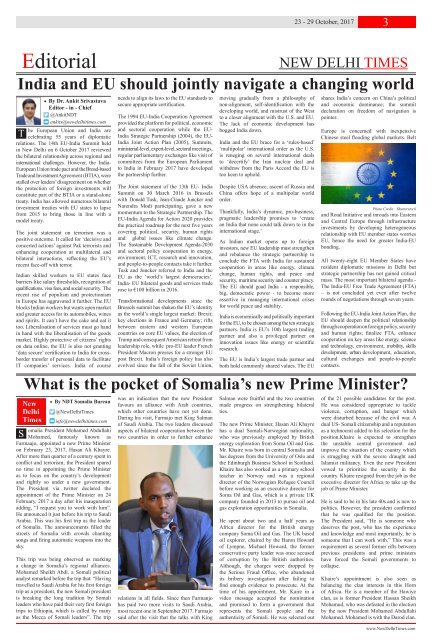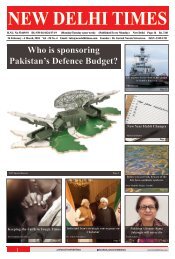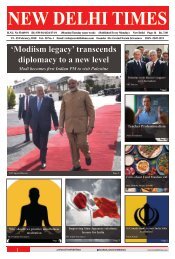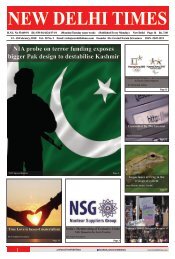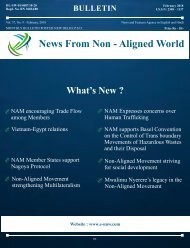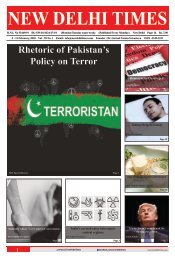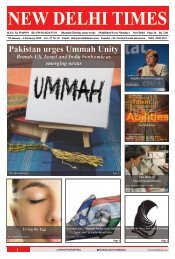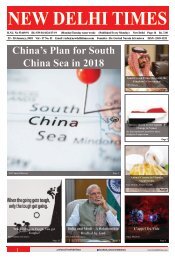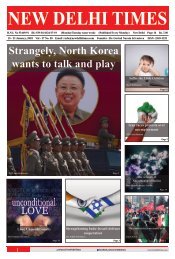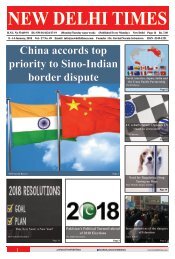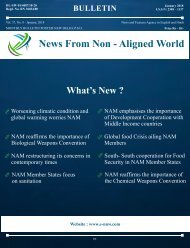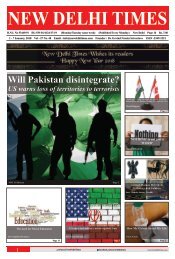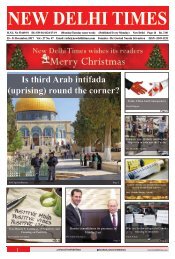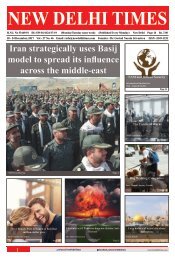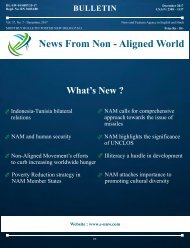23 - 29 October 2017
Create successful ePaper yourself
Turn your PDF publications into a flip-book with our unique Google optimized e-Paper software.
<strong>23</strong> - <strong>29</strong> <strong>October</strong>, <strong>2017</strong> 3<br />
T<br />
S<br />
Editorial<br />
◆◆<br />
By Dr. Ankit Srivastava<br />
Editor - in - Chief<br />
@AnkitNDT<br />
ankits@newdelhitimes.com<br />
◆◆<br />
By NDT Somalia Bureau<br />
@NewDelhiTimes<br />
info@newdelhitimes.com<br />
NEW DELHI TIMES<br />
India and EU should jointly navigate a changing world<br />
he European Union and India are<br />
celebrating 55 years of diplomatic<br />
relations. The 14th EU-India Summit held<br />
in New Delhi on 6 <strong>October</strong> <strong>2017</strong> reviewed<br />
the bilateral relationship across regional and<br />
international challenges. However, the India-<br />
European Union trade pact and the Broad-based<br />
Trade and Investment Agreement (BTIA), were<br />
stalled over leaders’ disagreement on whether<br />
the protection of foreign investments will<br />
constitute part of the BTIA or a stand-alone<br />
treaty. India has allowed numerous bilateral<br />
investment treaties with EU states to lapse<br />
from 2015 to bring those in line with a<br />
model treaty.<br />
The joint statement on terrorism was a<br />
positive outcome. It called for ‘decisive and<br />
concerted actions’ against Pak terrorists and<br />
enhancing cooperation at multilateral and<br />
bilateral interactions, reflecting the EU’s<br />
recent face-off with terror.<br />
Indian skilled workers to EU states face<br />
barriers like salary thresholds, recognition of<br />
qualifications, visa fees, and social security. The<br />
recent rise of populism and protectionism<br />
in Europe has aggravated it further. The EU<br />
blocks Indian workers but wants open market<br />
and greater access for its automobiles, wines<br />
and spirits. It can’t have the cake and eat it<br />
too. Liberalisation of services must go hand<br />
in hand with the liberalisation of the goods<br />
market. Highly protective of citizens’ rights<br />
on data online, the EU is also not granting<br />
‘data secure’ certification to India for crossborder<br />
transfer of personal data to facilitate<br />
IT companies’ services. India of course<br />
needs to align its laws to the EU standards to<br />
secure appropriate certification.<br />
The 1994 EU-India Cooperation Agreement<br />
provided the platform for political, economic<br />
and sectoral cooperation while the EU-<br />
India Strategic Partnership (2004), the EU-<br />
India Joint Action Plan (2005), Summits,<br />
ministerial-level, expert-level, sectoral meetings,<br />
regular parliamentary exchanges like visit of<br />
committees from the European Parliament<br />
to India in February <strong>2017</strong> have developed<br />
the partnership further.<br />
The Joint statement of the 13th EU- India<br />
Summit on 30 March 2016 in Brussels<br />
with Donald Tusk, Jean-Claude Juncker and<br />
Narendra Modi participating, gave a new<br />
momentum to the Strategic Partnership. The<br />
EU-India Agenda for Action 2020 provides<br />
the practical roadmap for the next five years<br />
covering political, security, human rights<br />
and global issues like climate change.<br />
The Sustainable Development Agenda-2030<br />
and sectoral policy cooperation in energy,<br />
environment, ICT, research and innovation,<br />
and people-to-people contacts take it further.<br />
Tusk and Juncker referred to India and the<br />
EU as the ‘world’s largest democracies’.<br />
India- EU bilateral goods and services trade<br />
rose to €100 billion in 2016.<br />
Transformational developments since the<br />
Brussels summit has shaken the EU’s identity<br />
as the world’s single largest market: Brexit;<br />
key elections in France and Germany; rifts<br />
between eastern and western European<br />
countries on core EU values, the election of<br />
Trump and consequent American retreat from<br />
leadership role, while pro-EU leader French<br />
President Macron presses for a stronger EU<br />
post Brexit. India’s foreign policy has also<br />
evolved since the fall of the Soviet Union,<br />
moving gradually from a philosophy of<br />
non-alignment, self-identification with the<br />
developing world, and mistrust of the West<br />
to a closer alignment with the U.S. and EU.<br />
The lack of economic development has<br />
bogged India down.<br />
India and the EU brace for a ‘rules-based’<br />
‘multipolar’ international order as the U.S.<br />
is reneging on several international deals<br />
to ‘decertify’ the Iran nuclear deal and<br />
withdraw from the Paris Accord the EU is<br />
too keen to uphold.<br />
Despite USA absence, ascent of Russia and<br />
China offers hope of a multipolar world<br />
order.<br />
Thankfully, India’s dynamic, pro-business,<br />
pragmatic leadership promises to ‘create<br />
an India that none could talk down to in the<br />
international stage.’<br />
As Indian market opens up to foreign<br />
investors, new EU leadership must strengthen<br />
and rebalance the strategic partnership to<br />
conclude the FTA with India for sustained<br />
cooperation in areas like energy, climate<br />
change, human rights, and peace and<br />
security, maritime security and counter piracy.<br />
The EU should goad India - a responsible,<br />
big, democratic power - to become more<br />
assertive in managing international crises<br />
for world peace and stability.<br />
India is economically and politically important<br />
for the EU, to be chosen among the ten strategic<br />
partners. India is EU’s 10th largest trading<br />
partner and also a privileged partner on<br />
innovation issues like energy or scientific<br />
research.<br />
The EU is India’s largest trade partner and<br />
both hold commonly shared values. The EU<br />
shares India’s concern on China’s political<br />
and economic dominance; the summit<br />
declaration on freedom of navigation is<br />
pointer.<br />
Europe is concerned with inexpensive<br />
Chinese steel flooding global markets. Belt<br />
Photo Credit : Shutterstock<br />
and Road Initiative and inroads into Eastern<br />
and Central Europe through infrastructure<br />
investments by developing heterogeneous<br />
relationship with EU member states worries<br />
EU, hence the need for greater India-EU<br />
bonding.<br />
All twenty-eight EU Member States have<br />
resident diplomatic missions in Delhi but<br />
strategic partnership has not gained critical<br />
mass. The most important bilateral agenda -<br />
The India-EU Free Trade Agreement (FTA)<br />
– is not concluded yet even after twelve<br />
rounds of negotiations through seven years.<br />
Following the EU-India Joint Action Plan, the<br />
EU should deepen the political relationship<br />
through cooperation on foreign policy, security<br />
and human rights; finalize FTA, enhance<br />
cooperation on key areas like energy, science<br />
and technology, environment, mobility, skills<br />
development, urban development, education,<br />
cultural exchanges and people-to-people<br />
contacts.<br />
What is the pocket of Somalia’s new Prime Minister?<br />
omalia President Mohamed Abdullahi<br />
Mohamed, famously known as<br />
Farmaajo, appointed a new Prime Minister<br />
on February <strong>23</strong>, <strong>2017</strong>, Hasan Ali Khayre.<br />
After more than quarter of a century spent in<br />
conflict and terrorism, the President spared<br />
no time in appointing the Prime Minister<br />
as to focus on the country’s development<br />
and rightly so under a new government.<br />
The President via twitter declared the<br />
appointment of the Prime Minister on 24<br />
February, <strong>2017</strong> a day after his inauguration<br />
adding, “I request you to work with him”.<br />
He announced it just before his trip to Saudi<br />
Arabia. This was his first trip as the leader<br />
of Somalia. The announcements filled the<br />
streets of Somalia with crowds chanting<br />
songs and firing automatic weapons into the<br />
sky.<br />
This trip was being observed as marking<br />
a change in Somalia’s regional alliances.<br />
Mohamed Sheikh Abdi, a Somali political<br />
analyst remarked before the trip that: “Having<br />
travelled to Saudi Arabia for his first foreign<br />
trip as a president, the new Somali president<br />
is breaking the long tradition by Somali<br />
leaders who have paid their very first foreign<br />
trips to Ethiopia, which is called by many<br />
as the Mecca of Somali leaders”. The trip<br />
was an indication that the new President<br />
favours an alliance with Arab countries,<br />
which other countries have not yet done.<br />
During his visit, Farmajo met King Salman<br />
of Saudi Arabia. The two leaders discussed<br />
aspects of bilateral cooperation between the<br />
two countries in order to further enhance<br />
relations in all fields. Since then Farmanjo<br />
has paid two more visits to Saudi Arabia,<br />
most recent one in September <strong>2017</strong>. Farmajo<br />
said after the visit that the talks with King<br />
Salman were fruitful and the two countries<br />
made progress on strengthening bilateral<br />
ties.<br />
The new Prime Minister, Hasan Ali Khayre<br />
has a dual Somali-Norwegian nationality,<br />
who was previously employed by British<br />
energy exploration from Soma Oil and Gas.<br />
Mr. Khaire was born in central Somalia and<br />
has degrees from the University of Oslo and<br />
the Edinburgh Business School in Scotland.<br />
Khaire has also worked as a primary school<br />
teacher in Norway and was a regional<br />
director of the Norwegian Refugee Council<br />
before working as an executive director for<br />
Soma Oil and Gas, which is a private UK<br />
company founded in 2013 to pursue oil and<br />
gas exploration opportunities in Somalia.<br />
He spent about two and a half years as<br />
Africa director for the British energy<br />
company Soma Oil and Gas. The UK based<br />
oil explorer, chaired by the Baron Howard<br />
of Lympne, Michael Howard, the former<br />
conservative party leader was once accused<br />
of corruption by the British authorities.<br />
Although, the charges were dropped by<br />
the Serious Fraud Office, who abandoned<br />
its bribery investigation after failing to<br />
find enough evidence to prosecute. At the<br />
time of his appointment, Mr. Kaire in a<br />
video message accepted the nomination<br />
and promised to form a government that<br />
represents the Somali people and the<br />
authenticity of Somali. He was selected out<br />
of the 21 possible candidates for the post.<br />
He was considered appropriate to tackle<br />
violence, corruption, and hunger which<br />
were disturbed because of the civil war. A<br />
dual US- Somali citizenship and a reputation<br />
as a technocrat added to his selection for the<br />
position.Khaire is expected to strengthen<br />
the unstable central government and<br />
improve the situation of the country which<br />
is struggling with the severe draught and<br />
Islamist militancy. Even the new President<br />
vowed to prioritize the security in the<br />
country. Khaire resigned from the job as the<br />
executive director for Africa to take up the<br />
job of Prime Minister.<br />
He is said to be in his late 40s and is new to<br />
politics. However, the president confirmed<br />
that he was qualified for the position.<br />
The President said, “He is someone who<br />
deserves the post, who has the experience<br />
and knowledge and most importantly, he is<br />
someone that I can work with.” This was a<br />
requirement as several former rifts between<br />
previous presidents and prime ministers<br />
have forced the Somali governments to<br />
collapse.<br />
Khaire’s appointment is also seen as<br />
balancing the clan interests in this Horn<br />
of Africa. He is a member of the Hawiye<br />
clan, as is former President Hassan Sheikh<br />
Mohamud, who was defeated in the election<br />
by the now President Mohamed Abdullahi<br />
Mohamed. Mohamed is with the Darod clan.<br />
www.NewDelhiTimes.com


